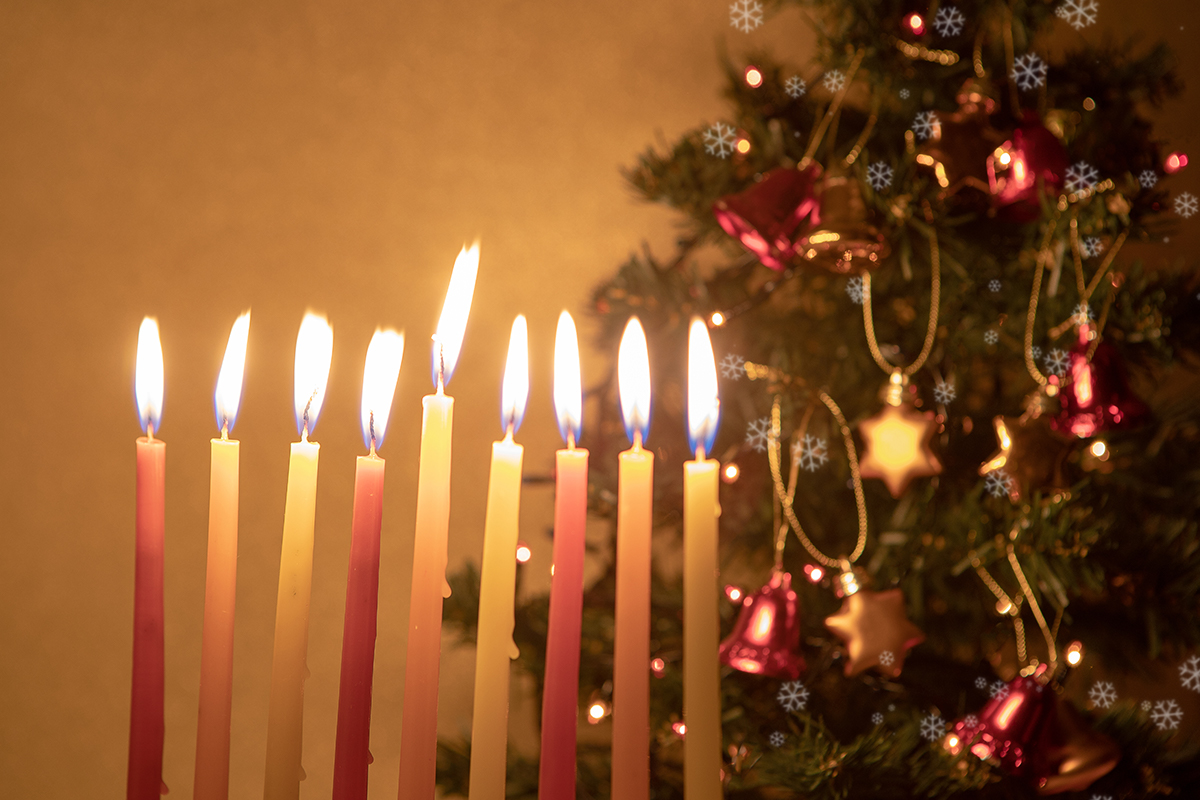This December is my first time with a Christmas tree in my home. And I’ll be honest, I’m uncomfortable with it. It’s big, and twinkly, just like in the movies, and looms (not over but might as well be) next to my Hanukkah menorah, which is certainly not nearly as showy.
You see, my partner is a gentile (a Christian if you ask my family, but not if you ask him). This year, due to lockdown, we are not spending Christmas with his family in Scotland, which is a bummer (for both of us). As a way to cheer him up, I offered him something I never thought I’d offer: We could get a Christmas tree.
He was surprised (and super happy), because in previous conversations on the topic I swore one of these would never cross my threshold.
For me, having a tree in my house always felt like a beacon of betrayal. A slap in the face to my ancestors. It meant that I had belittled all their sacrifices, swept aside the culture they had so painstakingly instilled in me, and all for some glitz and glam. I thought it would make me a “bad Jew” — unprincipled, willfully ignorant, and easily distracted by colorful lights.
In other words, a Christmas tree was totally off bounds for me, along with eggnog, presents, Christmas movies, carols, and all the other things I was dying for growing up, but which has all been hardwired into my brain as verboten by my Jewish parents (which I was looking forward to doing to my future kids).
But to my partner, Christmas is just about family and presents, and the tree is nothing but a large ornament that smells nice. There’s “nothing religious about it,” he insists. To me, though, it’s a “Christmas” tree, with an emphasis on the Christ part. It’s clearly a Christian symbol, but perhaps even more, the tree for me has always symbolized what I’m not and will never be
I still think the Christmas tree is an overtly Christian symbol no matter how much people try to define it as “secular,” but I also realized that isn’t the point. When I told my partner we could get a Christmas tree, he was thrilled to have me “on his side.” I could see that in his lovely face. So then I did something I rarely do: I shut up.
Because I love him, and I want to make a warm, comforting holiday season for him, and as he watches me light the candles eight days in a row without a clue, I figure I can do the same for him. Plus, I’ve always hated others who try to define my faith for me, so I shan’t do the same to him, or his lack thereof.
And so, a tree was bought, schlepped up the stairs, decorated with lights and ornaments, and now stares at me while I sneak glances at it from the corner of my eye.
I don’t know if I’ll ever be totally comfortable with a Christmas tree in my home, but if I know anything about Judaism and being Jewish, it’s that this was actually the Jewish thing to do.
“Shalom bayit,” the Hebrew phrase meaning “keeping the peace within the home,” is an important Jewish value. Indeed it’s a cornerstone for the Jewish family — especially those of the interfaith variety. A family will fall apart if they’re not able to compromise or let go of the things that are causing strife.
At the same time, Jews express our values through symbols, and anything can become a metaphor. Symbolism of faith and theological principles is ever-evolving, open to debate, conversation, interpretations, and when need be, adaptation. In other words, anything can become a symbol; as long as you can build a good argument to back your reasoning, it’s all kosher.
Which brings me to why all of this is actually a mitzvah. As a Jewish woman, my values guide me to go above and beyond to help create a loving home — to show my partner the love and kindness he shows me throughout the year, at every seder and Hanukkah he joyfully attends without judgment. My religion guides me to put my love and values into action, so together we have created a new symbol: a Christmas tree in our living room, in our peaceful home.



